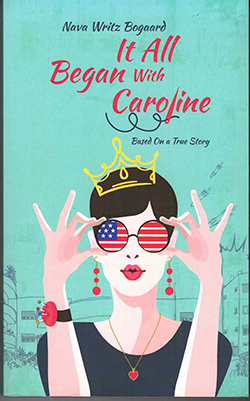It All Began with Caroline by Nava Writz Bogaard; © 2023; ISBN 9781088-204047; 485 pages; $16.99 via Amazon.

 SAN DIEGO – Often a public relations agent will contact a publication, in this case San Diego Jewish World, tell a little what a book is about, and offer to send it to the publication for review. If the publication accepts the book, it is bound to write a review – favorable or unfavorable depending on the reviewer’s reaction.
SAN DIEGO – Often a public relations agent will contact a publication, in this case San Diego Jewish World, tell a little what a book is about, and offer to send it to the publication for review. If the publication accepts the book, it is bound to write a review – favorable or unfavorable depending on the reviewer’s reaction.
As I got into the first part of this book, I thought I’d end up writing an unfavorable review. It reads like author Nava Writz Bogaard is taking petty revenge on her parents for all the slights she felt while growing up. According to her, she was ignored, dismissed, and ridiculed, and she therefore dreamed of escaping her childhood home. In her fantasies, she imagined herself to live like Princess Caroline, the daughter of Prince Rainer and Princess Grace of Monaco. Later, she heard of Caroline Kennedy and transferred her allegiance to the country in which the daughter of President John F. Kennedy and Jacqueline Kennedy flourished. She decided that more than anything else, she wanted to be an American.
However, she came from a poor Jewish family from Libya with seven children all crowded into a tiny apartment in Ramat Gan, Israel. Furthermore, she had dropped out of school. What chances of success did she have?
She recounts her experiences in the IDF, her first affairs highlighted by enjoying bubble baths with her lovers, and eventually finding work as a receptionist in a series of Tel Aviv hotels, where she honed her capacity for paying attention to detail and anticipating the needs of guests. She took lovers, had an abortion, taught herself English, obtained a tourist visa to visit America, accepted an invitation from a male hotel guest to stay at his apartment in Los Angeles, and entered into a marriage of convenience with him, enabling her to convert her 90-day tourist visa to that of an immigrant with a green card.
She set materialistic goals for herself, to one day live in a house with a winding staircase; to be interviewed on Good Morning America, whose host Joan Lunden she idolized, to drive a nice automobile, and to become a success.
My feelings about the book began to change from unfavorable to the plus side of neutral when she described her first, wide-eyed visit to New York City. She writes very well about positive things; I found myself wishing that her memoir had begun there.
The path to success started when she went to work as a sales clerk at Bellini Juvenile Furniture. With her eye for detail and intuition about what customers – particularly expectant mothers — might want, she arranged nursery showcases with a loving eye, picking out colors and fabrics for such accessories as bedding, draperies, and toys. Sales picked up. She audited classes at UCLA about merchandising. She persuaded the store owners to open a branch in Beverly Hills, where her customers numbered among well-known Hollywood actresses. Eventually, she went out on her own.
She and her first husband amicably divorced. Subsequently she remarried and adopted two sons. That marriage to an Israeli man also ended in divorce, but they lived near each other to be able to co-parent. Meanwhile, her brand and designs became better known. Her displays were placed in high-fashion children’s stores throughout the country, and around the globe. One day, she received a phone call that Joan Lunden, who had since retired, wanted a nursery designed for her child. Her idol and she became friendly.
When she told Lunden that it had been a dream of hers to appear on Good Morning America, they worked out a plan. She would design and install a nursery for a lucky viewer, who would be surprised on live national television with the result. Would-be contestants from throughout the United States filled out applications. Sensing a dramatic challenge, Nava picked out a couple expecting triplets. Good Morning America hyped the forthcoming show, providing wonderful publicity for her company, Nava’s Designs.
Through hard work, originality, luck, determination and chutzpah, the poor Israeli girl got rich, purchased homes in several cities around the world, and found love with a third husband, who came from the Netherlands, Albert Bogaard. The memoir ends in 2005 with the birth of the triplets, one of whom was named after her. Now, Nava expects to write a sequel chronicling the rest of her life.
*
Donald H. Harrison is publisher and editor of San Diego Jewish World.
Thank you, Don, for bringing this memoir to my attention. I appreciate your honest review of Nava’s journey and it was exciting to hear/read how she achieved her goals through chutzpah, coincidence and maybe divine intervention?